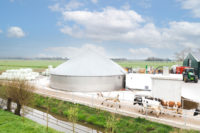Norfolk Southern Discloses Strategic Initiatives to Reduce GHG Emissions

Norfolk Southern Corp., Norfolk, Va., disclosed the railroad’s business strategy for reducing greenhouse gas emissions and its environmental footprint in a filing with the international not-for-profit CDP.
“Norfolk Southern is committed to being an industry leader in environmental stewardship,” says Blair Wimbush, vice president real estate and corporate sustainability officer. “Efforts to improve our performance and to mitigate the environmental impacts of business operations are part of daily life on our railroad. We are proud to offer customers a fuel- and carbon-efficient means of transporting their goods.”
In the CDP filing, Norfolk Southern describes key strategic initiatives to reduce greenhouse gas emissions, including
• Purchasing new, more fuel-efficient locomotives.
• Expanding use of idle-reduction and train-handling technologies.
• Making infrastructure improvements to increase capacity and fluidity of the company’s major rail corridors, including the Heartland and Crescent corridors.
• Continuing research and development of alternative power, including renewable biofuels and battery-powered locomotives.
• Upgrading office buildings, shops and yard facilities with more energy-efficient lighting and heating and air conditioning systems.
• Recycling older locomotives by equipping them with more fuel-efficient, cleaner-burning engines.
Norfolk Southern has reduced greenhouse gas emissions by 10% per revenue ton mile between 2009 and 2014. By the end of 2012, the company reached nearly 69% of its goal. Longer term, the railroad’s investments in infrastructure, including public-private partnerships, are expanding the nation’s freight rail capacity and providing shippers a way to reduce their supply chain carbon footprint. For example, by diverting long-haul freight to trains from trucks, Norfolk Southern’s Crescent Corridor—which spans 11 states from Louisiana to New Jersey—has the potential to reduce greenhouse gases by 1.9 million tons annually when fully developed.
CDP, formerly known as Carbon Disclosure Project, provides the only global system for companies and cities to measure, disclose, manage and share vital environmental information. CDP investor initiatives—backed in 2013 by more than 722 institutional investors representing an excess of $87 trillion in assets—give investors access to information about companies’ greenhouse gas emissions and strategies for managing climate change, water and deforestation risks.
Looking for a reprint of this article?
From high-res PDFs to custom plaques, order your copy today!









